header file to be included in all SMS application More...
#include <stdio.h>#include <stdlib.h>#include <math.h>#include <memory.h>#include <strings.h>#include <sndfile.h>

Go to the source code of this file.
Data Structures | |
| struct | SMS_Header |
| structure for the header of an SMS file More... | |
| struct | SMS_SndHeader |
| structure including sound header information More... | |
| struct | SMS_Data |
| structure with SMS data More... | |
| struct | SMS_SndBuffer |
| buffer for sound data More... | |
| struct | SMS_Peak |
| structure for sinusodial peak More... | |
| struct | SMS_AnalFrame |
| structure to hold an analysis frame More... | |
| struct | SMS_PeakParams |
| structure with useful information for peak detection and continuation More... | |
| struct | SMS_SEnvParams |
| structure information and data for spectral enveloping More... | |
| struct | SMS_AnalParams |
| structure with useful information for analysis functions More... | |
| struct | SMS_ModifyParams |
| structure with parameters and data that will be used to modify an SMS_Data frame More... | |
| struct | SMS_SynthParams |
| structure with information for synthesis functions More... | |
| struct | SMS_HarmCandidate |
| structure to hold information about a harmonic candidate More... | |
| struct | SMS_ContCandidate |
| structure to hold information about a continuation candidate More... | |
| struct | SMS_Guide |
| information attached to a guide More... | |
Defines | |
| #define | SMS_VERSION 1.1 |
| version control number | |
| #define | SMS_MAX_NPEAKS 400 |
| maximum number of peaks | |
| #define | sfloat float |
| #define | SMS_MAX_WINDOW 8190 |
| maximum size for analysis window | |
| #define | SMS_MIN_GOOD_FRAMES 3 |
| #define | SMS_MAX_DEVIATION .01 |
| #define | SMS_ANAL_DELAY 100 |
| #define | SMS_DELAY_FRAMES (SMS_MIN_GOOD_FRAMES + SMS_ANAL_DELAY) |
| #define | SMS_MIN_SIZE_FRAME 128 |
| #define | PI 3.141592653589793238462643 |
| #define | TWO_PI 6.28318530717958647692 |
| #define | INV_TWO_PI (1 / TWO_PI) |
| #define | PI_2 1.57079632679489661923 |
| #define | LOG2 0.69314718055994529 |
| #define | LOG10 2.3025850929940459 |
| #define | EXP 2.7182818284590451 |
| #define | MAX(a, b) ((a) > (b) ? (a) : (b)) |
| returns the maximum of a and b | |
| #define | MIN(a, b) ((a) < (b) ? (a) : (b)) |
| returns the minimum of a and b | |
Enumerations | |
| enum | SMS_Format { SMS_FORMAT_H, SMS_FORMAT_IH, SMS_FORMAT_HP, SMS_FORMAT_IHP } |
analysis format More... | |
| enum | SMS_SynthType { SMS_STYPE_ALL, SMS_STYPE_DET, SMS_STYPE_STOC } |
synthesis types More... | |
| enum | SMS_DetSynthType { SMS_DET_IFFT, SMS_DET_SIN } |
synthesis method for deterministic component More... | |
| enum | SMS_StocSynthType { SMS_STOC_NONE, SMS_STOC_APPROX, SMS_STOC_IFFT } |
synthesis method for stochastic component More... | |
| enum | SMS_SpecEnvType { SMS_ENV_NONE, SMS_ENV_CEP, SMS_ENV_FBINS } |
synthesis method for deterministic component More... | |
| enum | SMS_ERRORS { SMS_OK, SMS_NOPEN, SMS_NSMS, SMS_MALLOC, SMS_RDERR, SMS_WRERR, SMS_SNDERR } |
Error codes returned by SMS file functions. More... | |
| enum | SMS_DBG { SMS_DBG_NONE, SMS_DBG_DET, SMS_DBG_PEAK_DET, SMS_DBG_HARM_DET, SMS_DBG_PEAK_CONT, SMS_DBG_CLEAN_TRAJ, SMS_DBG_SINE_SYNTH, SMS_DBG_STOC_ANAL, SMS_DBG_STOC_SYNTH, SMS_DBG_SMS_ANAL, SMS_DBG_ALL, SMS_DBG_RESIDUAL, SMS_DBG_SYNC } |
debug modes More... | |
| enum | SMS_SOUND_TYPE { SMS_SOUND_TYPE_MELODY, SMS_SOUND_TYPE_NOTE } |
| enum | SMS_DIRECTION { SMS_DIR_FWD, SMS_DIR_REV } |
| enum | SMS_WINDOWS { SMS_WIN_HAMMING, SMS_WIN_BH_62, SMS_WIN_BH_70, SMS_WIN_BH_74, SMS_WIN_BH_92, SMS_WIN_HANNING, SMS_WIN_IFFT } |
| enum | SMS_FRAME_STATUS { SMS_FRAME_EMPTY, SMS_FRAME_READY, SMS_FRAME_PEAKS_FOUND, SMS_FRAME_FUND_FOUND, SMS_FRAME_TRAJ_FOUND, SMS_FRAME_CLEANED, SMS_FRAME_RECOMPUTED, SMS_FRAME_DETER_SYNTH, SMS_FRAME_STOC_COMPUTED, SMS_FRAME_DONE, SMS_FRAME_END } |
frame status More... | |
Functions | |
| sfloat | sms_magToDB (sfloat x) |
| convert from magnitude to decibel | |
| sfloat | sms_dBToMag (sfloat x) |
| convert from decibel to magnitude | |
| void | sms_arrayMagToDB (int sizeArray, sfloat *pArray) |
| convert an array from magnitude to decibel | |
| void | sms_arrayDBToMag (int sizeArray, sfloat *pArray) |
| convert and array from decibel (0-100) to magnitude (0-1) | |
| void | sms_setMagThresh (sfloat x) |
| set the linear magnitude threshold | |
| sfloat | sms_rms (int sizeArray, sfloat *pArray) |
| Root Mean Squared of an array. | |
| sfloat | sms_sine (sfloat fTheta) |
| table-lookup sine method | |
| sfloat | sms_sinc (sfloat fTheta) |
| global sinc table-lookup method | |
| sfloat | sms_random (void) |
| random number genorator | |
| int | sms_power2 (int n) |
| make sure a number is a power of 2 | |
| sfloat | sms_scalarTempered (float x) |
| void | sms_arrayScalarTempered (int sizeArray, sfloat *pArray) |
| scale an array of linear frequencies to the well-tempered scale | |
| int | sms_analyze (int sizeWaveform, sfloat *pWaveform, SMS_Data *pSmsFrame, SMS_AnalParams *pAnalParams) |
| main function to perform the SMS analysis on a single frame | |
| void | sms_analyzeFrame (int iCurrentFrame, SMS_AnalParams *pAnalParams, sfloat fRefFundamental) |
| compute spectrum, find peaks, and fundamental of one frame | |
| int | sms_init (void) |
| initialize global data | |
| void | sms_free (void) |
| free global data | |
| int | sms_initAnalysis (SMS_AnalParams *pAnalParams, SMS_SndHeader *pSoundHeader) |
| initialize analysis data structure's arrays | |
| void | sms_initAnalParams (SMS_AnalParams *pAnalParams) |
| give default values to an SMS_AnalParams struct | |
| void | sms_initSynthParams (SMS_SynthParams *synthParams) |
| give default values to an SMS_SynthParams struct | |
| int | sms_initSynth (SMS_Header *pSmsHeader, SMS_SynthParams *pSynthParams) |
| initialize synthesis data structure's arrays | |
| int | sms_changeSynthHop (SMS_SynthParams *pSynthParams, int sizeHop) |
| void | sms_freeAnalysis (SMS_AnalParams *pAnalParams) |
| free analysis data | |
| void | sms_freeSynth (SMS_SynthParams *pSynthParams) |
| free analysis data | |
| void | sms_fillSoundBuffer (int sizeWaveform, sfloat *pWaveform, SMS_AnalParams *pAnalParams) |
| fill the sound buffer | |
| void | sms_windowCentered (int sizeWindow, sfloat *pWaveform, float *pWindow, int sizeFft, float *pFftBuffer) |
| void | sms_getWindow (int sizeWindow, sfloat *pWindow, int iWindowType) |
| main function for getting various windows | |
| void | sms_scaleWindow (int sizeWindow, sfloat *pWindow) |
| int | sms_spectrum (int sizeWindow, sfloat *pWaveform, float *pWindow, int sizeMag, sfloat *pMag, float *pPhase) |
| int | sms_invSpectrum (int sizeWaveform, sfloat *pWaveform, float *pWindow, int sizeMag, sfloat *pMag, float *pPhase) |
| int | sms_invQuickSpectrumW (sfloat *pFMagSpectrum, float *pFPhaseSpectrum, int sizeFft, sfloat *pFWaveform, int sizeWave, sfloat *pFWindow) |
| int | sms_spectralApprox (sfloat *pSpec1, int sizeSpec1, int sizeSpec1Used, sfloat *pSpec2, int sizeSpec2, int nCoefficients) |
| approximate a magnitude spectrum First downsampling using local maxima and then upsampling using linear interpolation. The output spectrum doesn't have to be the same size as the input one. | |
| int | sms_spectrumMag (int sizeWindow, sfloat *pWaveform, float *pWindow, int sizeMag, sfloat *pMag) |
| void | sms_dCepstrum (int sizeCepstrum, sfloat *pCepstrum, int sizeFreq, float *pFreq, float *pMag, sfloat fLambda, int iSamplingRate) |
| void | sms_dCepstrumEnvelope (int sizeCepstrum, sfloat *pCepstrum, int sizeEnv, float *pEnv) |
| void | sms_spectralEnvelope (SMS_Data *pSmsData, SMS_SEnvParams *pSpecEnvParams) |
| main function for computing spectral envelope from sinusoidal peaks | |
| int | sms_sizeNextWindow (int iCurrentFrame, SMS_AnalParams *pAnalParams) |
| set window size for next frame | |
| sfloat | sms_fundDeviation (SMS_AnalParams *pAnalParams, int iCurrentFrame) |
| get deviation from average fundamental \ | |
| int | sms_detectPeaks (int sizeSpec, sfloat *pFMag, float *pPhase, SMS_Peak *pSpectralPeaks, SMS_PeakParams *pPeakParams) |
| void | sms_harmDetection (SMS_AnalFrame *pFrame, sfloat fRefFundamental, SMS_PeakParams *pPeakParams) |
| main harmonic detection function | |
| int | sms_peakContinuation (int iFrame, SMS_AnalParams *pAnalParams) |
| function to advance the guides through the next frame | |
| sfloat | sms_preEmphasis (float fInput) |
| sfloat | sms_deEmphasis (float fInput) |
| void | sms_cleanTracks (int iCurrentFrame, SMS_AnalParams *pAnalParams) |
| fill gaps and delete short tracks | |
| void | sms_scaleDet (sfloat *pSynthBuffer, float *pOriginalBuffer, sfloat *pSinAmp, SMS_AnalParams *pAnalParams, int nTracks) |
| int | sms_prepSine (int nTableSize) |
| prepares the sine table | |
| int | sms_prepSinc (int nTableSize) |
| prepare the Sinc table | |
| void | sms_clearSine (void) |
| clear sine table | |
| void | sms_clearSinc (void) |
| clear sine table | |
| void | sms_synthesize (SMS_Data *pSmsFrame, sfloat *pSynthesis, SMS_SynthParams *pSynthParams) |
| synthesizes one frame of SMS data | |
| void | sms_sineSynthFrame (SMS_Data *pSmsFrame, sfloat *pBuffer, int sizeBuffer, SMS_Data *pLastFrame, int iSamplingRate) |
| generate all the sinusoids for a given frame | |
| void | sms_initHeader (SMS_Header *pSmsHeader) |
| initialize the header structure of an SMS file | |
| int | sms_getHeader (char *pChFileName, SMS_Header **ppSmsHeader, FILE **ppInputFile) |
| function to read SMS header | |
| void | sms_fillHeader (SMS_Header *pSmsHeader, SMS_AnalParams *pAnalParams, char *pProgramString) |
| fill an SMS header with necessary information for storage | |
| int | sms_writeHeader (char *pFileName, SMS_Header *pSmsHeader, FILE **ppOutSmsFile) |
| write SMS header to file | |
| int | sms_writeFile (FILE *pSmsFile, SMS_Header *pSmsHeader) |
| rewrite SMS header and close file | |
| int | sms_initFrame (int iCurrentFrame, SMS_AnalParams *pAnalParams, int sizeWindow) |
| initialize the current frame | |
| int | sms_allocFrame (SMS_Data *pSmsFrame, int nTracks, int nCoeff, int iPhase, int stochType, int nEnvCoeff) |
| allocate memory for a frame of SMS data | |
| int | sms_allocFrameH (SMS_Header *pSmsHeader, SMS_Data *pSmsFrame) |
| function to allocate an SMS data frame using an SMS_Header | |
| int | sms_getFrame (FILE *pInputFile, SMS_Header *pSmsHeader, int iFrame, SMS_Data *pSmsFrame) |
| read an SMS data frame | |
| int | sms_writeFrame (FILE *pSmsFile, SMS_Header *pSmsHeader, SMS_Data *pSmsFrame) |
| write SMS frame | |
| void | sms_freeFrame (SMS_Data *pSmsFrame) |
| free the SMS data structure | |
| void | sms_clearFrame (SMS_Data *pSmsFrame) |
| clear the SMS data structure | |
| void | sms_copyFrame (SMS_Data *pCopySmsFrame, SMS_Data *pOriginalSmsFrame) |
| copy a frame of SMS_Data | |
| int | sms_frameSizeB (SMS_Header *pSmsHeader) |
| get the size in bytes of the frame in a SMS file | |
| int | sms_residual (int sizeWindow, sfloat *pSynthesis, float *pOriginal, float *pResidual, float *pWindow) |
| void | sms_filterHighPass (int sizeResidual, sfloat *pResidual, int iSamplingRate) |
| function to filter a waveform with a high-pass filter | |
| int | sms_stocAnalysis (int sizeWindow, sfloat *pResidual, float *pWindow, SMS_Data *pSmsFrame) |
| void | sms_interpolateFrames (SMS_Data *pSmsFrame1, SMS_Data *pSmsFrame2, SMS_Data *pSmsFrameOut, sfloat fInterpFactor) |
| function to interpolate two SMS frames | |
| int | sms_openSF (char *pChInputSoundFile, SMS_SndHeader *pSoundHeader) |
| open a sound file and check its header | |
| void | sms_closeSF () |
| close a sound file that was open for reading | |
| int | sms_getSound (SMS_SndHeader *pSoundHeader, long sizeSound, sfloat *pSound, long offset) |
| get a chunk of sound from input file | |
| int | sms_createSF (char *pChOutputSoundFile, int iSamplingRate, int iType) |
| function to create an output sound file | |
| void | sms_writeSound (sfloat *pBuffer, int sizeBuffer) |
| write to the sound file data | |
| void | sms_writeSF (void) |
| function to write the output sound file to disk | |
| void | sms_fft (int sizeFft, sfloat *pArray) |
| Forward Fast Fourier Transform. | |
| void | sms_ifft (int sizeFft, sfloat *pArray) |
| Inverse Forward Fast Fourier Transform. | |
| void | sms_RectToPolar (int sizeSpec, sfloat *pReal, float *pMag, float *pPhase) |
| void | sms_PolarToRect (int sizeSpec, sfloat *pReal, float *pMag, float *pPhase) |
| void | sms_spectrumRMS (int sizeMag, sfloat *pReal, float *pMag) |
| void | sms_initModify (SMS_Header *header, SMS_ModifyParams *params) |
| initialize a modifications structure based on an SMS_Header | |
| void | sms_initModifyParams (SMS_ModifyParams *params) |
| initialize modification parameters | |
| void | sms_freeModify (SMS_ModifyParams *params) |
| free memory allocated during initialization | |
| void | sms_modify (SMS_Data *frame, SMS_ModifyParams *params) |
| modify a frame (SMS_Data object) | |
| int | sms_createResSF (int iSamplingRate) |
| function to create the residual sound file | |
| int | sms_writeResSound (sfloat *pBuffer, int sizeBuffer) |
| function to write to the residual sound file | |
| void | sms_writeResSF (void) |
| write the residual sound file to disk | |
| int | sms_createDebugFile (SMS_AnalParams *pAnalParams) |
| function to create the debug file | |
| void | sms_writeDebugData (sfloat *pBuffer1, float *pBuffer2, sfloat *pBuffer3, int sizeBuffer) |
| void | sms_writeDebugFile (void) |
| function to write the residual sound file to disk | |
| void | sms_error (char *pErrorMessage) |
| get a string containing information about the error code | |
| int | sms_errorCheck (void) |
| check if an error has been reported | |
| char * | sms_errorString (void) |
| get a string containing information about the last error | |
header file to be included in all SMS application
| #define sfloat float |
| #define SMS_ANAL_DELAY 100 |
number of frames in the past to be looked in possible re-analyze
Referenced by ReAnalyzeFrame().
| #define SMS_DELAY_FRAMES (SMS_MIN_GOOD_FRAMES + SMS_ANAL_DELAY) |
total number of delay frames
Referenced by sms_analyze(), and sms_initAnalParams().
| #define SMS_MAX_DEVIATION .01 |
maximum deviation allowed
Referenced by ReAnalyzeFrame(), and sms_analyze().
| #define SMS_MAX_NPEAKS 400 |
maximum number of peaks
Referenced by GetNextClosestPeak(), GetNextMax(), sms_initAnalysis(), and sms_initFrame().
| #define SMS_MAX_WINDOW 8190 |
maximum size for analysis window
Referenced by sms_initAnalysis(), and sms_sizeNextWindow().
| #define SMS_MIN_GOOD_FRAMES 3 |
minimum number of stable frames for backward search
Referenced by ReAnalyzeFrame(), and sms_fundDeviation().
| #define SMS_MIN_SIZE_FRAME 128 |
Referenced by sms_initSynthParams().
| #define SMS_VERSION 1.1 |
version control number
| enum SMS_DBG |
debug modes
| SMS_DBG_NONE |
0, no debugging |
| SMS_DBG_DET |
1, not yet implemented
|
| SMS_DBG_PEAK_DET |
2, peak detection function |
| SMS_DBG_HARM_DET |
3, harmonic detection function |
| SMS_DBG_PEAK_CONT |
4, peak continuation function |
| SMS_DBG_CLEAN_TRAJ |
5, clean tracks function |
| SMS_DBG_SINE_SYNTH |
6, sine synthesis function |
| SMS_DBG_STOC_ANAL |
7, stochastic analysis function |
| SMS_DBG_STOC_SYNTH |
8, stochastic synthesis function |
| SMS_DBG_SMS_ANAL |
9, top level analysis function |
| SMS_DBG_ALL |
10, everything |
| SMS_DBG_RESIDUAL |
11, write residual to file |
| SMS_DBG_SYNC |
12, write original, synthesis and residual to a text file |
| enum SMS_DetSynthType |
synthesis method for deterministic component
There are two options for deterministic synthesis available to the SMS synthesizer. The Inverse Fast Fourier Transform method (IFFT) is more effecient for models with lots of partial tracks, but can possibly smear transients. The Sinusoidal Table Lookup (SIN) can theoritically support faster moving tracks at a higher fidelity, but can consume lots of cpu at varying rates.
| enum SMS_DIRECTION |
| enum SMS_ERRORS |
| enum SMS_Format |
analysis format
Is the signal is known to be harmonic, using format harmonic (with out without phase) will give more accuracy to the peak continuation algorithm. If the signal is known to be inharmonic, then it is best to use one of the inharmonic settings to tell the peak continuation algorithm to just look at the peaks and connect them, instead of trying to look for peaks at specific frequencies (harmonic partials).
| enum SMS_FRAME_STATUS |
| enum SMS_SOUND_TYPE |
| enum SMS_SpecEnvType |
synthesis method for deterministic component
There are two options for deterministic synthesis available to the SMS synthesizer. The Inverse Fast Fourier Transform method (IFFT) is more effecient for models with lots of partial tracks, but can possibly smear transients. The Sinusoidal Table Lookup (SIN) can theoritically support faster moving tracks at a higher fidelity, but can consume lots of cpu at varying rates.
| enum SMS_StocSynthType |
synthesis method for stochastic component
Currently, Stochastic Approximation is the only reasonable choice for stochastic synthesis: this method approximates the spectrum of the stochastic component by a specified number of coefficients during analyses, and then approximates another set of coefficients during synthesis in order to fit the specified hopsize. The phases of the coefficients are randomly generated, according to the theory that a stochastic spectrum consists of random phases.
The Inverse FFT method is not implemented, but is based on the idea of storing the exact spectrum and phases of the residual component to file. Synthesis could then be an exact reconstruction of the original signal, provided interpolation is not necessary.
No stochastic component can also be specified in order to skip the this time consuming process altogether. This is especially useful when performing multiple analyses to fine tune parameters pertaining to the determistic component; once that is achieved, the stochastic component will be much better as well.
| enum SMS_SynthType |
synthesis types
These values are used to determine whether to synthesize both deterministic and stochastic components together, the deterministic component alone, or the stochastic component alone.
| enum SMS_WINDOWS |
| int sms_allocFrame | ( | SMS_Data * | pSmsFrame, | |
| int | nTracks, | |||
| int | nStochCoeff, | |||
| int | iPhase, | |||
| int | stochType, | |||
| int | nEnvCoeff | |||
| ) |
allocate memory for a frame of SMS data
| pSmsFrame | pointer to a frame of SMS data | |
| nTracks | number of sinusoidal tracks in frame | |
| nStochCoeff | number of stochastic coefficients in frame | |
| iPhase | whether phase information is in the frame | |
| stochType | stochastic resynthesis type | |
| nStochCoeff | number of envelope coefficients in frame | |
| nEnvCoeff | number of envelope coefficients in frame |
References SMS_Data::nCoeff, SMS_Data::nEnvCoeff, SMS_Data::nTracks, SMS_Data::pFSinAmp, SMS_Data::pFSinFreq, SMS_Data::pFSinPha, SMS_Data::pFStocCoeff, SMS_Data::pFStocGain, SMS_Data::pResPhase, SMS_Data::pSmsData, SMS_Data::pSpecEnv, sfloat, SMS_Data::sizeData, sms_error(), SMS_STOC_APPROX, and SMS_STOC_IFFT.
Referenced by sms_allocFrameH(), sms_initAnalysis(), and sms_initSynth().

| int sms_allocFrameH | ( | SMS_Header * | pSmsHeader, | |
| SMS_Data * | pSmsFrame | |||
| ) |
function to allocate an SMS data frame using an SMS_Header
this one is used when you have only read the header, such as after opening a file.
| pSmsHeader | pointer to SMS header | |
| pSmsFrame | pointer to SMS frame |
References SMS_Header::iFormat, SMS_Header::iStochasticType, SMS_Header::nEnvCoeff, SMS_Header::nStochasticCoeff, SMS_Header::nTracks, sms_allocFrame(), SMS_FORMAT_HP, and SMS_FORMAT_IHP.

| int sms_analyze | ( | int | sizeWaveform, | |
| sfloat * | pWaveform, | |||
| SMS_Data * | pSmsData, | |||
| SMS_AnalParams * | pAnalParams | |||
| ) |
main function to perform the SMS analysis on a single frame
The input is a section of the sound, the output is the SMS data
| sizeWaveform | size of input waveform data | |
| pWaveform | pointer to input waveform data | |
| pSmsData | pointer to output SMS data | |
| pAnalParams | pointer to analysis parameters |
References SMS_AnalFrame::deterministic, SMS_AnalParams::fDefaultFundamental, SMS_AnalFrame::fFundamental, SMS_AnalParams::fResidualAccumPerc, SMS_AnalParams::iCleanTracks, SMS_AnalParams::iDefaultSizeWindow, SMS_AnalParams::iFormat, SMS_AnalFrame::iFrameSample, SMS_SndBuffer::iMarker, SMS_AnalParams::iMaxDelayFrames, SMS_AnalParams::iSamplingRate, SMS_AnalParams::iSoundType, SMS_AnalFrame::iStatus, SMS_AnalParams::iStochasticType, SMS_SEnvParams::iType, MAX, MIN, SMS_AnalFrame::nPeaks, SMS_Data::nTracks, SMS_SndBuffer::pFBuffer, SMS_Data::pFSinAmp, SMS_Data::pFSinFreq, SMS_Data::pFSinPha, SMS_Data::pFStocCoeff, SMS_AnalParams::ppFrames, SMS_Data::pResPhase, SMS_AnalParams::prevFrame, ReAnalyzeFrame(), sfloat, SMS_SndBuffer::sizeBuffer, SMS_AnalParams::sizeHop, SMS_AnalParams::sizeNextRead, sms_analyzeFrame(), sms_arrayDBToMag(), sms_cleanTracks(), sms_clearFrame(), SMS_DELAY_FRAMES, SMS_ENV_NONE, sms_error(), sms_errorCheck(), sms_errorString(), sms_fillSoundBuffer(), sms_filterHighPass(), SMS_FORMAT_HP, SMS_FORMAT_IH, SMS_FORMAT_IHP, SMS_FRAME_DONE, SMS_FRAME_EMPTY, SMS_FRAME_END, SMS_FRAME_READY, sms_fundDeviation(), sms_getWindow(), sms_initFrame(), SMS_MAX_DEVIATION, sms_peakContinuation(), sms_power2(), sms_residual(), sms_scaleDet(), sms_scaleWindow(), sms_sineSynthFrame(), sms_sizeNextWindow(), SMS_SOUND_TYPE_NOTE, sms_spectralEnvelope(), sms_spectrum(), SMS_STOC_APPROX, SMS_STOC_IFFT, SMS_STOC_NONE, sms_stocAnalysis(), SMS_WIN_HAMMING, SMS_AnalParams::soundBuffer, SMS_AnalParams::specEnvParams, and SMS_AnalParams::synthBuffer.
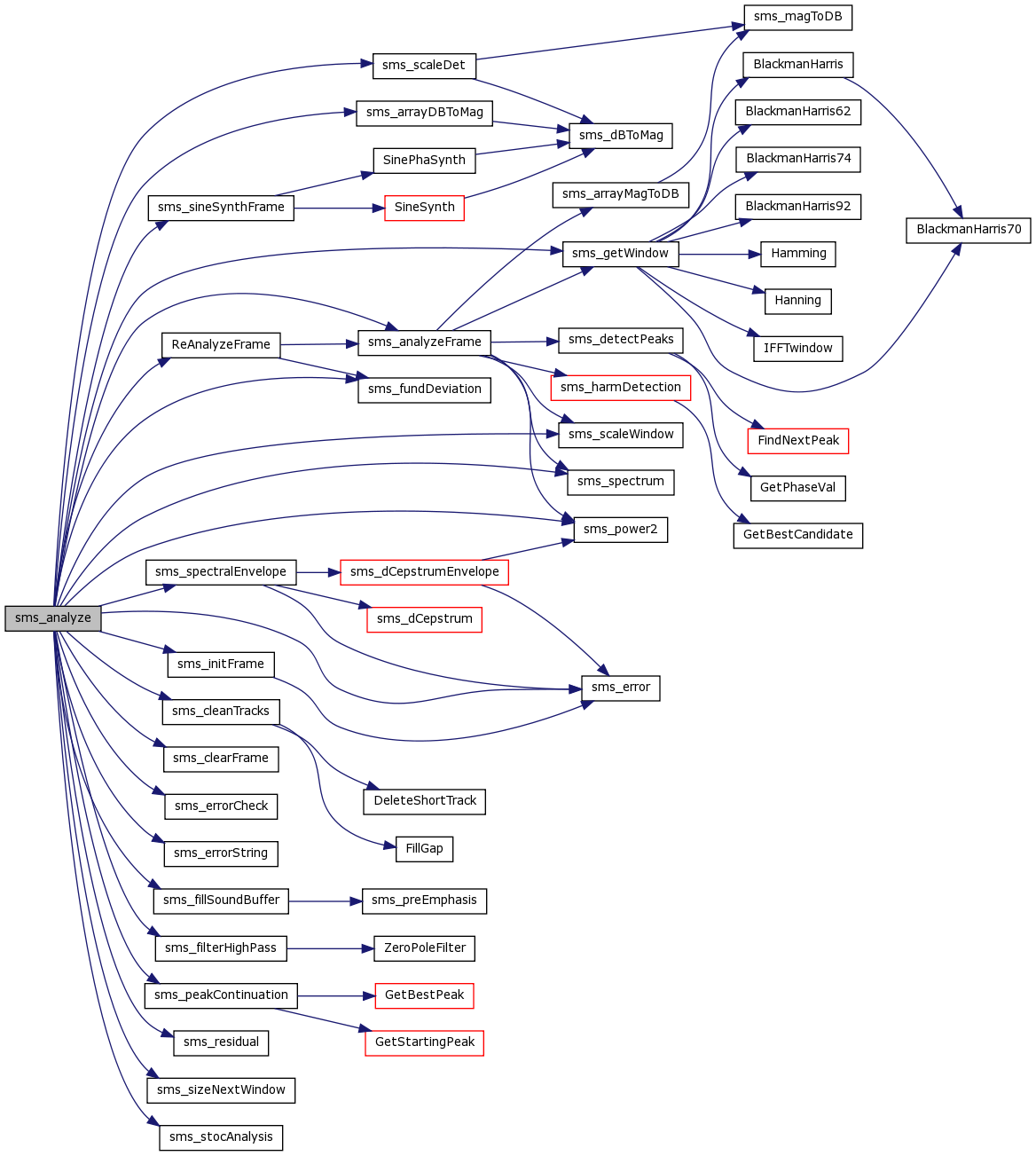
| void sms_analyzeFrame | ( | int | iCurrentFrame, | |
| SMS_AnalParams * | pAnalParams, | |||
| sfloat | fRefFundamental | |||
| ) |
compute spectrum, find peaks, and fundamental of one frame
This is the main core of analysis calls
| iCurrentFrame | frame number to be computed | |
| pAnalParams | structure of analysis parameters | |
| fRefFundamental | reference fundamental |
References SMS_AnalParams::iFormat, SMS_AnalFrame::iFrameSample, SMS_AnalFrame::iFrameSize, SMS_SndBuffer::iMarker, SMS_AnalParams::iWindowType, SMS_AnalFrame::nPeaks, SMS_AnalParams::peakParams, SMS_SndBuffer::pFBuffer, SMS_AnalParams::ppFrames, SMS_AnalFrame::pSpectralPeaks, sfloat, sms_arrayMagToDB(), sms_detectPeaks(), SMS_FORMAT_H, SMS_FORMAT_HP, sms_getWindow(), sms_harmDetection(), SMS_MAX_SPEC, sms_power2(), sms_scaleWindow(), sms_spectrum(), and SMS_AnalParams::soundBuffer.
Referenced by ReAnalyzeFrame(), and sms_analyze().
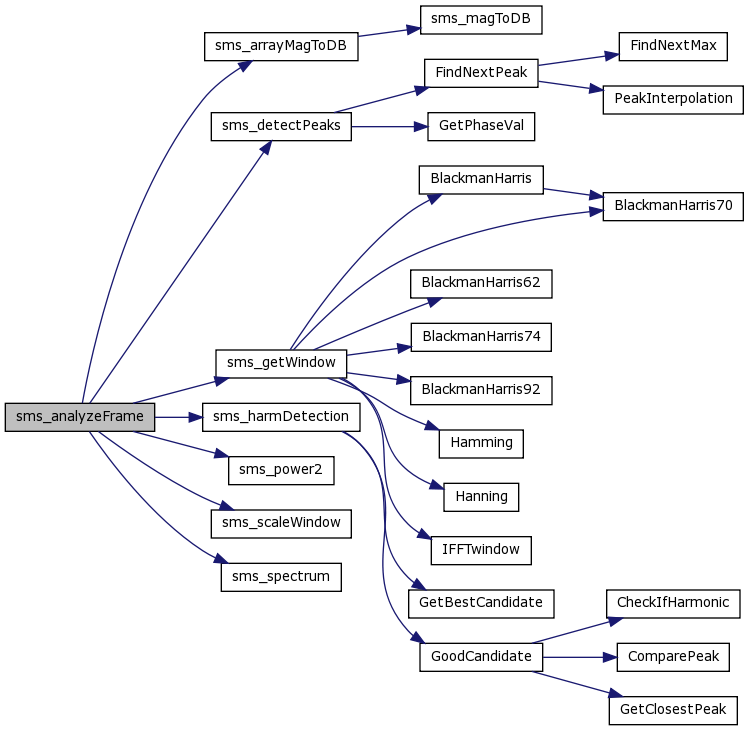
| int sms_changeSynthHop | ( | SMS_SynthParams * | pSynthParams, | |
| int | sizeHop | |||
| ) |
References SMS_SynthParams::pFDetWindow, SMS_SynthParams::pFStocWindow, SMS_SynthParams::pMagBuff, SMS_SynthParams::pPhaseBuff, SMS_SynthParams::pSpectra, SMS_SynthParams::pSynthBuff, sfloat, SMS_SynthParams::sizeHop, sms_getWindow(), SMS_OK, SMS_WIN_HANNING, and SMS_WIN_IFFT.
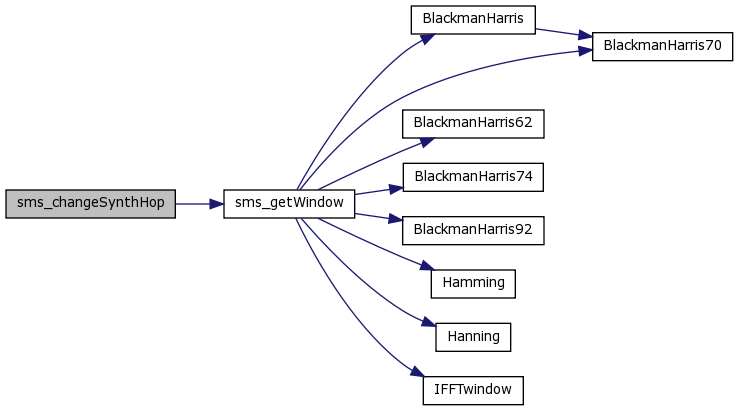
| void sms_cleanTracks | ( | int | iCurrentFrame, | |
| SMS_AnalParams * | pAnalParams | |||
| ) |
fill gaps and delete short tracks
| iCurrentFrame | current frame number | |
| pAnalParams | pointer to analysis parameters |
References DeleteShortTrack(), SMS_AnalFrame::deterministic, FillGap(), SMS_AnalParams::iDebugMode, SMS_AnalParams::iFormat, SMS_AnalFrame::iFrameNum, SMS_AnalParams::iMaxSleepingTime, SMS_AnalParams::iMinTrackLength, SMS_AnalParams::nGuides, SMS_Data::pFSinAmp, SMS_Data::pFSinFreq, SMS_Data::pFSinPha, SMS_AnalParams::ppFrames, SMS_DBG_ALL, SMS_DBG_CLEAN_TRAJ, SMS_FORMAT_H, and SMS_FORMAT_HP.
Referenced by sms_analyze().

| void sms_clearFrame | ( | SMS_Data * | pSmsFrame | ) |
clear the SMS data structure
| pSmsFrame | pointer to frame of SMS data |
References SMS_Data::pSmsData, and SMS_Data::sizeData.
Referenced by sms_analyze().
| void sms_clearSinc | ( | void | ) |
| void sms_clearSine | ( | void | ) |
| void sms_closeSF | ( | ) |
close a sound file that was open for reading
References pSNDStream.
copy a frame of SMS_Data
| pCopySmsData | copy of frame | |
| pOriginalSmsData | original frame |
References MIN, SMS_Data::nCoeff, SMS_Data::nTracks, SMS_Data::pFSinAmp, SMS_Data::pFSinFreq, SMS_Data::pFSinPha, SMS_Data::pFStocCoeff, SMS_Data::pFStocGain, SMS_Data::pResPhase, SMS_Data::pSmsData, sfloat, and SMS_Data::sizeData.
| int sms_createDebugFile | ( | SMS_AnalParams * | pAnalParams | ) |
function to create the debug file
| pAnalParams | pointer to analysis params |
References pChDebugFile, pDebug, SMS_OK, and SMS_WRERR.
| int sms_createResSF | ( | int | iSamplingRate | ) |
function to create the residual sound file
| iSamplingRate | samplerate of sound file |
References pChResidualFile, pResidualSNDStream, sfResidualHeader, and sms_error().

| int sms_createSF | ( | char * | pChOutputSoundFile, | |
| int | iSamplingRate, | |||
| int | iType | |||
| ) |
function to create an output sound file
| pChOutputSoundFile | name of output file | |
| iSamplingRate | sampling rate of synthesis | |
| iType | output file format (0 is wav, 1 is aiff, or other is libsndfile specific) |
References pOutputSNDStream, sfOutputSoundHeader, and sms_error().

| void sms_dCepstrum | ( | int | sizeCepstrum, | |
| sfloat * | pCepstrum, | |||
| int | sizeFreq, | |||
| float * | pFreq, | |||
| float * | pMag, | |||
| sfloat | fLambda, | |||
| int | iSamplingRate | |||
| ) |
| void sms_dCepstrumEnvelope | ( | int | sizeCepstrum, | |
| sfloat * | pCepstrum, | |||
| int | sizeEnv, | |||
| float * | pEnv | |||
| ) |
| sfloat sms_deEmphasis | ( | float | fInput | ) |
| int sms_detectPeaks | ( | int | sizeSpec, | |
| sfloat * | pFMag, | |||
| float * | pPhase, | |||
| SMS_Peak * | pSpectralPeaks, | |||
| SMS_PeakParams * | pPeakParams | |||
| ) |
| void sms_error | ( | char * | pErrorMessage | ) |
get a string containing information about the error code
| pErrorMessage | pointer to error message string |
References error_message, and error_status.
Referenced by sms_allocFrame(), sms_analyze(), sms_createResSF(), sms_createSF(), sms_dCepstrumEnvelope(), sms_getFrame(), sms_getHeader(), sms_getSound(), sms_init(), sms_initAnalysis(), sms_initFrame(), sms_initModify(), sms_initSynth(), sms_invSpectrum(), sms_openSF(), sms_spectralApprox(), sms_spectralEnvelope(), sms_spectrum(), sms_spectrumMag(), sms_stocAnalysis(), sms_writeFile(), sms_writeFrame(), and sms_writeHeader().
| int sms_errorCheck | ( | void | ) |
check if an error has been reported
References error_status.
Referenced by sms_analyze().
| char* sms_errorString | ( | void | ) |
get a string containing information about the last error
References error_message, and error_status.
Referenced by sms_analyze().
| void sms_fft | ( | int | sizeFft, | |
| sfloat * | pArray | |||
| ) |
Forward Fast Fourier Transform.
function to call the OOURA routines to calculate the forward FFT. Operation is in place.
| sizeFft | size of the FFT in samples (must be a power of 2 >= 2) | |
| pArray | pointer to real array (n >= 2, n = power of 2) |
Referenced by sms_dCepstrumEnvelope(), sms_spectrum(), and sms_spectrumMag().
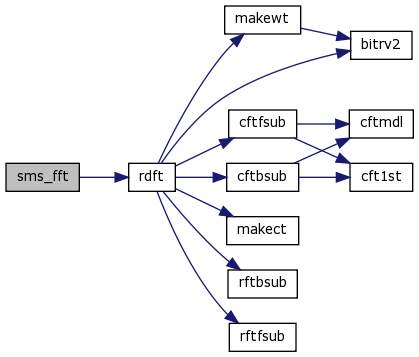
| void sms_fillHeader | ( | SMS_Header * | pSmsHeader, | |
| SMS_AnalParams * | pAnalParams, | |||
| char * | pProgramString | |||
| ) |
fill an SMS header with necessary information for storage
copies parameters from SMS_AnalParams, along with other values so an SMS file can be stored and correctly synthesized at a later time. This is somewhat of a convenience function.
sms_initAnal() should be done first to properly set everything.
| pSmsHeader | header for SMS file (to be stored) | |
| pAnalParams | structure of analysis parameters | |
| pProgramString | pointer to a string containing the name of the program that made the analysis data |
References SMS_AnalParams::fDefaultFundamental, SMS_AnalParams::fFreqDeviation, SMS_AnalParams::fFundContToGuide, SMS_AnalParams::fHighestFreq, SMS_AnalParams::fHighestFundamental, SMS_AnalParams::fLowestFundamental, SMS_AnalParams::fMinPeakMag, SMS_AnalParams::fMinRefHarmMag, SMS_AnalParams::fPeakContToGuide, SMS_AnalParams::fRefHarmMagDiffFromMax, SMS_AnalParams::fSizeWindow, SMS_AnalParams::iAnalysisDirection, SMS_AnalParams::iCleanTracks, SMS_Header::iEnvType, SMS_AnalParams::iFormat, SMS_Header::iFormat, SMS_Header::iFrameBSize, SMS_AnalParams::iFrameRate, SMS_Header::iFrameRate, SMS_Header::iMaxFreq, SMS_AnalParams::iMaxSleepingTime, SMS_AnalParams::iMinTrackLength, SMS_AnalParams::iRefHarmonic, SMS_AnalParams::iSamplingRate, SMS_Header::iSamplingRate, SMS_AnalParams::iSoundType, SMS_AnalParams::iStochasticType, SMS_Header::iStochasticType, SMS_SEnvParams::iType, SMS_AnalParams::iWindowType, SMS_SEnvParams::nCoeff, SMS_Header::nEnvCoeff, SMS_AnalParams::nFrames, SMS_Header::nFrames, SMS_AnalParams::nGuides, SMS_AnalParams::nStochasticCoeff, SMS_Header::nStochasticCoeff, SMS_Header::nTextCharacters, SMS_AnalParams::nTracks, SMS_Header::nTracks, SMS_Header::pChTextCharacters, pChTextString, sms_frameSizeB(), sms_initHeader(), SMS_STOC_NONE, and SMS_AnalParams::specEnvParams.

| void sms_fillSoundBuffer | ( | int | sizeWaveform, | |
| sfloat * | pWaveform, | |||
| SMS_AnalParams * | pAnalParams | |||
| ) |
fill the sound buffer
| sizeWaveform | size of input data | |
| pWaveform | input data | |
| pAnalParams | pointer to structure of analysis parameters |
References SMS_AnalParams::iAnalysisDirection, SMS_SndBuffer::iFirstGood, SMS_SndBuffer::iMarker, MAX, SMS_SndBuffer::pFBuffer, sfloat, SMS_SndBuffer::sizeBuffer, SMS_DIR_REV, sms_preEmphasis(), and SMS_AnalParams::soundBuffer.
Referenced by sms_analyze().

| void sms_filterHighPass | ( | int | sizeResidual, | |
| sfloat * | pResidual, | |||
| int | iSamplingRate | |||
| ) |
function to filter a waveform with a high-pass filter
cutoff =1500 Hz
| sizeResidual | size of signal | |
| pResidual | pointer to residual signal | |
| iSamplingRate | sampling rate of signal |
References sfloat, and ZeroPoleFilter().
Referenced by sms_analyze().

| int sms_frameSizeB | ( | SMS_Header * | pSmsHeader | ) |
get the size in bytes of the frame in a SMS file
| pSmsHeader | pointer to SMS header |
References SMS_Header::iFormat, SMS_Header::iStochasticType, SMS_Header::nEnvCoeff, SMS_Header::nStochasticCoeff, SMS_Header::nTracks, sfloat, SMS_FORMAT_H, SMS_FORMAT_IH, SMS_STOC_APPROX, and SMS_STOC_IFFT.
Referenced by sms_fillHeader().
| void sms_free | ( | void | ) |
free global data
deallocates memory allocated to global arrays (windows and tables)
References initIsDone, sms_clearSinc(), and sms_clearSine().

| void sms_freeAnalysis | ( | SMS_AnalParams * | pAnalParams | ) |
free analysis data
frees all the memory allocated to an SMS_AnalParams by sms_initAnalysis
| pAnalParams | pointer to analysis data structure |
References SMS_AnalFrame::deterministic, SMS_AnalParams::iMaxDelayFrames, SMS_SndBuffer::pFBuffer, SMS_AnalParams::pFrames, SMS_AnalParams::ppFrames, SMS_AnalParams::prevFrame, sms_freeFrame(), SMS_AnalParams::soundBuffer, and SMS_AnalParams::synthBuffer.

| void sms_freeFrame | ( | SMS_Data * | pSmsFrame | ) |
free the SMS data structure
| pSmsFrame | pointer to frame of SMS data |
References SMS_Data::nCoeff, SMS_Data::nTracks, SMS_Data::pFSinAmp, SMS_Data::pFSinFreq, SMS_Data::pFStocCoeff, SMS_Data::pFStocGain, SMS_Data::pResPhase, SMS_Data::pSmsData, and SMS_Data::sizeData.
Referenced by sms_freeAnalysis(), and sms_freeSynth().
| void sms_freeModify | ( | SMS_ModifyParams * | params | ) |
free memory allocated during initialization
| params | pointer to parameter structure |
| void sms_freeSynth | ( | SMS_SynthParams * | pSynthParams | ) |
free analysis data
frees all the memory allocated to an SMS_SynthParams by sms_initSynthesis
| pSynthParams | pointer to synthesis data structure |
References SMS_SynthParams::pFDetWindow, SMS_SynthParams::pFStocWindow, SMS_SynthParams::pMagBuff, SMS_SynthParams::pPhaseBuff, SMS_SynthParams::prevFrame, SMS_SynthParams::pSpectra, SMS_SynthParams::pSynthBuff, and sms_freeFrame().

| sfloat sms_fundDeviation | ( | SMS_AnalParams * | pAnalParams, | |
| int | iCurrentFrame | |||
| ) |
get deviation from average fundamental \
| pAnalParams | pointer to analysis params | |
| iCurrentFrame | number of current frame |
References SMS_AnalFrame::fFundamental, SMS_AnalParams::ppFrames, sfloat, and SMS_MIN_GOOD_FRAMES.
Referenced by ReAnalyzeFrame(), and sms_analyze().
| int sms_getFrame | ( | FILE * | pSmsFile, | |
| SMS_Header * | pSmsHeader, | |||
| int | iFrame, | |||
| SMS_Data * | pSmsFrame | |||
| ) |
read an SMS data frame
| pSmsFile | pointer to SMS file | |
| pSmsHeader | pointer to SMS header | |
| iFrame | frame number | |
| pSmsFrame | pointer to SMS frame |
References SMS_Header::iFrameBSize, SMS_Header::iHeadBSize, SMS_Data::pSmsData, and sms_error().

| int sms_getHeader | ( | char * | pChFileName, | |
| SMS_Header ** | ppSmsHeader, | |||
| FILE ** | ppSmsFile | |||
| ) |
function to read SMS header
| pChFileName | file name for SMS file | |
| ppSmsHeader | (double pointer to) SMS header | |
| ppSmsFile | (double pointer to) inputfile |
References sms_error(), and SMS_MAGIC.

| int sms_getSound | ( | SMS_SndHeader * | pSoundHeader, | |
| long | sizeSound, | |||
| sfloat * | pSound, | |||
| long | offset | |||
| ) |
get a chunk of sound from input file
This function will copy to samples from the channel specified by SMS_SndHeader->iReadChannel to an array, which is by default the first channel.
| pSoundHeader | sound header information to hold extracted information | |
| sizeSound | number of samples read | |
| pSound | buffer for samples read | |
| offset | which sound frame to start reading from |
References SMS_SndHeader::channelCount, SMS_SndHeader::iReadChannel, MAX_SAMPLES, pSNDStream, sfloat, sms_error(), and SMS_MALLOC.

| void sms_getWindow | ( | int | sizeWindow, | |
| sfloat * | pFWindow, | |||
| int | iWindowType | |||
| ) |
main function for getting various windows
| sizeWindow | window size | |
| pFWindow | window array | |
| iWindowType | the desired window type defined by SMS_WINDOWS |
References BlackmanHarris(), BlackmanHarris62(), BlackmanHarris70(), BlackmanHarris74(), BlackmanHarris92(), Hamming(), Hanning(), IFFTwindow(), SMS_WIN_BH_62, SMS_WIN_BH_70, SMS_WIN_BH_74, SMS_WIN_BH_92, SMS_WIN_HAMMING, SMS_WIN_HANNING, and SMS_WIN_IFFT.
Referenced by InitializeHybrid(), sms_analyze(), sms_analyzeFrame(), sms_changeSynthHop(), and sms_initSynth().
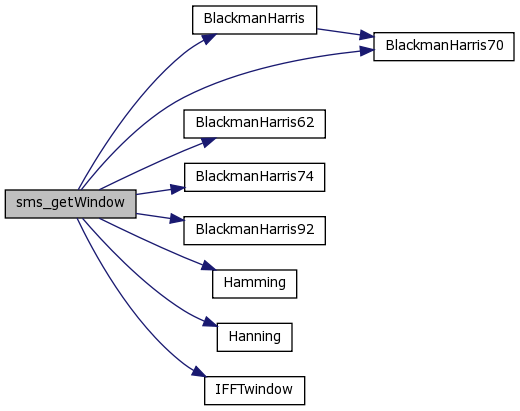
| void sms_harmDetection | ( | SMS_AnalFrame * | pFrame, | |
| sfloat | fRefFundamental, | |||
| SMS_PeakParams * | pPeakParams | |||
| ) |
main harmonic detection function
find a given harmonic peak from a set of spectral peaks, put the frequency of the fundamental in the current frame
| pFrame | pointer to current frame | |
| fRefFundamental | frequency of previous frame | |
| pPeakParams | pointer to analysis parameters |
is it possible to use pSpectralPeaks instead of SMS_AnalFrame?
move pCHarmonic array to SMS_AnalFrame structure
<
References SMS_HarmCandidate::fFreq, SMS_Peak::fFreq, SMS_AnalFrame::fFundamental, SMS_PeakParams::fHighestFundamental, SMS_PeakParams::fLowestFreq, SMS_Peak::fMag, GetBestCandidate(), GoodCandidate(), SMS_PeakParams::iRefHarmonic, N_HARM_PEAKS, SMS_AnalFrame::pSpectralPeaks, and sfloat.
Referenced by sms_analyzeFrame().

| void sms_ifft | ( | int | sizeFft, | |
| sfloat * | pArray | |||
| ) |
Inverse Forward Fast Fourier Transform.
function to call the OOURA routines to calculate the Inverse FFT. Operation is in place.
| sizeFft | size of the FFT in samples (must be a power of 2 >= 2) | |
| pArray | pointer to real array (n >= 2, n = power of 2) |
Referenced by SineSynthIFFT(), sms_invQuickSpectrumW(), sms_invSpectrum(), and sms_synthesize().
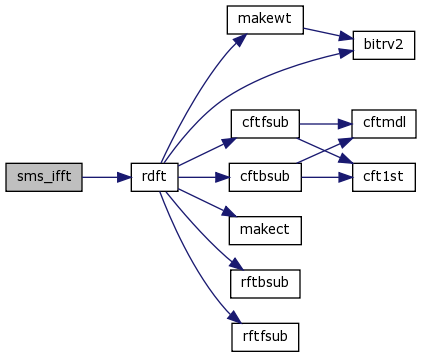
| int sms_init | ( | void | ) |
initialize global data
Currently, just generating the sine and sinc tables. This is necessary before both analysis and synthesis.
If using the Mersenne Twister algorithm for random number generation, initialize (seed) it.
References init_gen_rand(), initIsDone, SIZE_TABLES, sms_error(), sms_prepSinc(), and sms_prepSine().
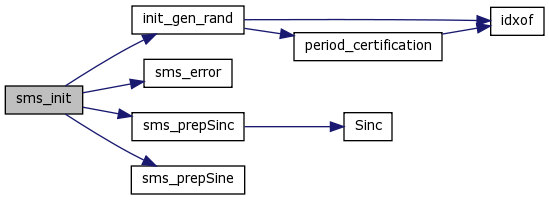
| void sms_initAnalParams | ( | SMS_AnalParams * | pAnalParams | ) |
give default values to an SMS_AnalParams struct
This will initialize an SMS_AnalParams with values that work for common analyses. It is useful to start with and then adjust the parameters manually to fit a particular sound
Certain things are hard coded in here that will have to be updated later (i.e. samplerate), so it is best to call this function first, then fill whatever parameters need to be adjusted.
| pAnalParams | pointer to analysis data structure |
< depends on iFrameRate normally
< depends on iFrameRate normally
< no sound yet
< no frames yet
References SMS_AnalParams::fDefaultFundamental, SMS_AnalParams::fFreqDeviation, SMS_AnalParams::fFundContToGuide, SMS_AnalParams::fHighestFreq, SMS_AnalParams::fHighestFundamental, SMS_SEnvParams::fLambda, SMS_AnalParams::fLowestFundamental, SMS_AnalParams::fMinPeakMag, SMS_AnalParams::fMinRefHarmMag, SMS_AnalParams::fPeakContToGuide, SMS_AnalParams::fRefHarmMagDiffFromMax, SMS_AnalParams::fResidualAccumPerc, SMS_AnalParams::fSizeWindow, SMS_AnalParams::iAnalysisDirection, SMS_SEnvParams::iAnchor, SMS_AnalParams::iCleanTracks, SMS_AnalParams::iDebugMode, SMS_AnalParams::iDefaultSizeWindow, SMS_AnalParams::iFormat, SMS_AnalParams::iFrameRate, SMS_AnalParams::iMaxDelayFrames, SMS_SEnvParams::iMaxFreq, SMS_AnalParams::iMaxSleepingTime, SMS_AnalParams::iMinTrackLength, SMS_SEnvParams::iOrder, SMS_AnalParams::iRefHarmonic, SMS_AnalParams::iSamplingRate, SMS_AnalParams::iSizeSound, SMS_AnalParams::iSoundType, SMS_AnalParams::iStochasticType, SMS_SEnvParams::iType, SMS_AnalParams::iWindowType, MAX, SMS_SEnvParams::nCoeff, SMS_AnalParams::nFrames, SMS_AnalParams::nGuides, SMS_AnalParams::nStochasticCoeff, SMS_AnalParams::nTracks, SMS_AnalParams::sizeHop, SMS_DELAY_FRAMES, SMS_DIR_FWD, SMS_ENV_NONE, SMS_FORMAT_H, SMS_SOUND_TYPE_MELODY, SMS_STOC_APPROX, SMS_WIN_BH_70, and SMS_AnalParams::specEnvParams.
| int sms_initAnalysis | ( | SMS_AnalParams * | pAnalParams, | |
| SMS_SndHeader * | pSoundHeader | |||
| ) |
initialize analysis data structure's arrays
based on the SMS_AnalParams current settings, this function will initialize the sound, synth, and fft arrays. It is necessary before analysis. there can be multple SMS_AnalParams at the same time
| pAnalParams | pointer to analysis paramaters | |
| pSoundHeader | pointer to sound header |
References SMS_AnalFrame::deterministic, SMS_AnalParams::fDefaultFundamental, SMS_PeakParams::fHighestFreq, SMS_AnalParams::fHighestFreq, SMS_PeakParams::fHighestFundamental, SMS_AnalParams::fHighestFundamental, SMS_PeakParams::fLowestFreq, SMS_AnalParams::fLowestFundamental, SMS_AnalParams::fMinPeakMag, SMS_PeakParams::fMinPeakMag, SMS_AnalParams::fMinRefHarmMag, SMS_PeakParams::fMinRefHarmMag, SMS_AnalParams::fRefHarmMagDiffFromMax, SMS_PeakParams::fRefHarmMagDiffFromMax, SMS_AnalParams::fSizeWindow, SMS_AnalParams::iDefaultSizeWindow, SMS_SndBuffer::iFirstGood, SMS_AnalParams::iFrameRate, SMS_SndBuffer::iMarker, SMS_AnalParams::iMaxDelayFrames, SMS_SEnvParams::iMaxFreq, SMS_PeakParams::iMaxPeaks, SMS_SEnvParams::iOrder, SMS_AnalParams::iRefHarmonic, SMS_PeakParams::iRefHarmonic, SMS_PeakParams::iSamplingRate, SMS_AnalParams::iSamplingRate, SMS_SndHeader::iSamplingRate, SMS_AnalParams::iSizeSound, SMS_AnalParams::iSoundType, SMS_PeakParams::iSoundType, SMS_AnalFrame::iStatus, SMS_AnalParams::iStochasticType, SMS_SEnvParams::iType, SMS_SEnvParams::nCoeff, SMS_AnalParams::nFrames, SMS_AnalParams::nGuides, SMS_SndHeader::nSamples, SMS_AnalParams::nStochasticCoeff, SMS_AnalParams::peakParams, SMS_SndBuffer::pFBuffer, SMS_AnalParams::pFrames, SMS_AnalParams::ppFrames, SMS_AnalParams::prevFrame, sfloat, SMS_SndBuffer::sizeBuffer, SMS_AnalParams::sizeHop, SMS_AnalParams::sizeNextRead, sms_allocFrame(), SMS_ENV_CEP, SMS_ENV_FBINS, sms_error(), SMS_FRAME_EMPTY, SMS_MAX_NPEAKS, SMS_MAX_WINDOW, sms_power2(), SMS_STOC_IFFT, SMS_AnalParams::soundBuffer, SMS_AnalParams::specEnvParams, and SMS_AnalParams::synthBuffer.

| int sms_initFrame | ( | int | iCurrentFrame, | |
| SMS_AnalParams * | pAnalParams, | |||
| int | sizeWindow | |||
| ) |
initialize the current frame
initializes arrays to zero and sets the correct sample position. Special care is taken at the end the sample source (if there is not enough samples for an entire frame.
| iCurrentFrame | frame number of current frame in buffer | |
| pAnalParams | analysis parameters | |
| sizeWindow | size of analysis window |
References SMS_AnalFrame::deterministic, SMS_AnalFrame::fFundamental, SMS_AnalFrame::iFrameNum, SMS_AnalFrame::iFrameSample, SMS_AnalFrame::iFrameSize, SMS_SndBuffer::iMarker, SMS_AnalParams::iSizeSound, SMS_AnalFrame::iStatus, SMS_AnalParams::nGuides, SMS_AnalFrame::nPeaks, SMS_Data::pFSinAmp, SMS_Data::pFSinFreq, SMS_Data::pFSinPha, SMS_AnalParams::ppFrames, SMS_AnalFrame::pSpectralPeaks, sfloat, SMS_AnalParams::sizeHop, sms_error(), SMS_FRAME_END, SMS_FRAME_READY, SMS_MAX_NPEAKS, SMS_OK, and SMS_AnalParams::soundBuffer.
Referenced by sms_analyze().

| void sms_initHeader | ( | SMS_Header * | pSmsHeader | ) |
initialize the header structure of an SMS file
| pSmsHeader | header for SMS file |
References SMS_Header::fResidualPerc, SMS_Header::iFormat, SMS_Header::iFrameBSize, SMS_Header::iFrameRate, SMS_Header::iHeadBSize, SMS_Header::iMaxFreq, SMS_Header::iSmsMagic, SMS_Header::iStochasticType, SMS_Header::nEnvCoeff, SMS_Header::nFrames, SMS_Header::nStochasticCoeff, SMS_Header::nTextCharacters, SMS_Header::nTracks, SMS_Header::pChTextCharacters, SMS_FORMAT_H, SMS_MAGIC, and SMS_STOC_APPROX.
Referenced by sms_fillHeader().
| void sms_initModify | ( | SMS_Header * | header, | |
| SMS_ModifyParams * | params | |||
| ) |
initialize a modifications structure based on an SMS_Header
| params | pointer to parameter structure | |
| header | pointer to sms header |
References SMS_Header::iMaxFreq, SMS_ModifyParams::maxFreq, SMS_Header::nEnvCoeff, SMS_ModifyParams::ready, sfloat, SMS_ModifyParams::sinEnv, SMS_ModifyParams::sizeSinEnv, and sms_error().

| void sms_initModifyParams | ( | SMS_ModifyParams * | params | ) |
initialize modification parameters
| params | pointer to parameters structure |
References SMS_ModifyParams::doResEnv, SMS_ModifyParams::doResGain, SMS_ModifyParams::doSinEnv, SMS_ModifyParams::doTranspose, SMS_ModifyParams::ready, SMS_ModifyParams::resEnvInterp, SMS_ModifyParams::resGain, SMS_ModifyParams::sinEnvInterp, SMS_ModifyParams::sizeResEnv, SMS_ModifyParams::sizeSinEnv, and SMS_ModifyParams::transpose.
Referenced by sms_initSynthParams().
| int sms_initSynth | ( | SMS_Header * | pSmsHeader, | |
| SMS_SynthParams * | pSynthParams | |||
| ) |
initialize synthesis data structure's arrays
Initialize the synthesis and fft arrays. It is necessary before synthesis. there can be multple SMS_SynthParams at the same time This function also sets some initial values that will create a sane synthesis environment.
This function requires an SMS_Header because it may be called to synthesize a stored .sms file, which contains a header with necessary information.
| pSmsHeader | pointer to SMS_Header | |
| pSynthParams | pointer to synthesis paramaters |
References SMS_Header::iFrameRate, SMS_Header::iMaxFreq, SMS_SynthParams::iOriginalSRate, SMS_SynthParams::iSamplingRate, SMS_Header::iSamplingRate, SMS_Header::iStochasticType, SMS_SynthParams::iStochasticType, SMS_ModifyParams::maxFreq, SMS_SynthParams::modParams, SMS_Header::nEnvCoeff, SMS_Header::nStochasticCoeff, SMS_Header::nTracks, SMS_SynthParams::origSizeHop, SMS_SynthParams::pFDetWindow, SMS_SynthParams::pFStocWindow, SMS_SynthParams::pMagBuff, SMS_SynthParams::pPhaseBuff, SMS_SynthParams::prevFrame, SMS_SynthParams::pSpectra, SMS_SynthParams::pSynthBuff, sfloat, SMS_SynthParams::sizeHop, sms_allocFrame(), sms_error(), sms_getWindow(), SMS_OK, sms_power2(), SMS_WIN_HANNING, and SMS_WIN_IFFT.
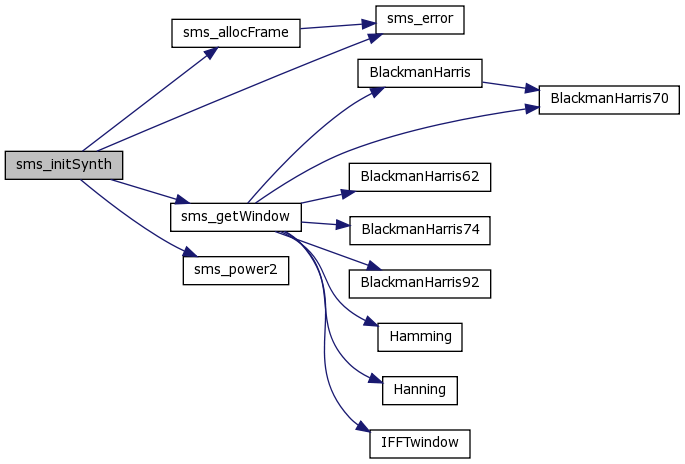
| void sms_initSynthParams | ( | SMS_SynthParams * | synthParams | ) |
give default values to an SMS_SynthParams struct
This will initialize an SMS_SynthParams with values that work for common analyses. It is useful to start with and then adjust the parameters manually to fit a particular sound
| synthParams | pointer to synthesis parameters data structure |
References SMS_SynthParams::iDetSynthType, SMS_SynthParams::iSamplingRate, SMS_SynthParams::iSynthesisType, SMS_SynthParams::modParams, SMS_SynthParams::sizeHop, SMS_DET_IFFT, sms_initModifyParams(), SMS_MIN_SIZE_FRAME, and SMS_STYPE_ALL.

| void sms_interpolateFrames | ( | SMS_Data * | pSmsFrame1, | |
| SMS_Data * | pSmsFrame2, | |||
| SMS_Data * | pSmsFrameOut, | |||
| sfloat | fInterpFactor | |||
| ) |
function to interpolate two SMS frames
this assumes that the two frames are of the same size
| pSmsFrame1 | sms frame 1 | |
| pSmsFrame2 | sms frame 2 | |
| pSmsFrameOut | sms output frame | |
| fInterpFactor | interpolation factor |
References SMS_Data::nCoeff, SMS_Data::nEnvCoeff, SMS_Data::nTracks, SMS_Data::pFSinAmp, SMS_Data::pFSinFreq, SMS_Data::pFStocCoeff, SMS_Data::pFStocGain, SMS_Data::pSpecEnv, and sfloat.
| int sms_invQuickSpectrumW | ( | sfloat * | pFMagSpectrum, | |
| float * | pFPhaseSpectrum, | |||
| int | sizeFft, | |||
| sfloat * | pFWaveform, | |||
| int | sizeWave, | |||
| sfloat * | pFWindow | |||
| ) |
Referenced by StocSynthApprox().
| int sms_invSpectrum | ( | int | sizeWaveform, | |
| sfloat * | pWaveform, | |||
| float * | pWindow, | |||
| int | sizeMag, | |||
| sfloat * | pMag, | |||
| float * | pPhase | |||
| ) |
| void sms_modify | ( | SMS_Data * | frame, | |
| SMS_ModifyParams * | params | |||
| ) |
modify a frame (SMS_Data object)
Performs a modification on a SMS_Data object. The type of modification and any additional parameters are specified in the given SMS_ModifyParams structure.
References SMS_ModifyParams::doResGain, SMS_ModifyParams::doSinEnv, SMS_ModifyParams::doTranspose, SMS_ModifyParams::maxFreq, SMS_Data::nEnvCoeff, SMS_Data::nTracks, SMS_Data::pFSinAmp, SMS_Data::pFSinFreq, SMS_Data::pSpecEnv, SMS_ModifyParams::resGain, SMS_ModifyParams::sinEnv, SMS_ModifyParams::sinEnvInterp, SMS_ModifyParams::sizeSinEnv, sms_applyEnvelope(), sms_interpEnvelopes(), sms_resGain(), sms_transpose(), and SMS_ModifyParams::transpose.
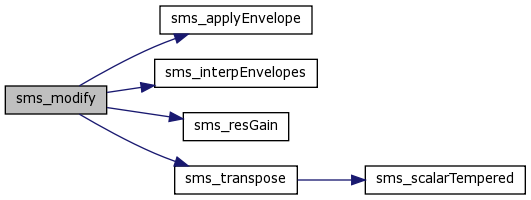
| int sms_openSF | ( | char * | pChInputSoundFile, | |
| SMS_SndHeader * | pSoundHeader | |||
| ) |
open a sound file and check its header
Defualt channel to read is 1. If the user wishes to read from a different channel when calling sms_getSound, they need to set SMS_SndHeader->iReadChannel to the desired channel number.
| pChInputSoundFile | name of soundfile | |
| pSoundHeader | information of the sound |
References SMS_SndHeader::channelCount, SMS_SndHeader::iReadChannel, SMS_SndHeader::iSamplingRate, SMS_SndHeader::nSamples, pSNDStream, sfSoundHeader, SMS_SndHeader::sizeHeader, and sms_error().

| int sms_peakContinuation | ( | int | iFrame, | |
| SMS_AnalParams * | pAnalParams | |||
| ) |
function to advance the guides through the next frame
the output is the frequency, magnitude, and phase tracks
| iFrame | current frame number | |
| pAnalParams | analysis parameters |
References SMS_AnalFrame::deterministic, SMS_AnalParams::fDefaultFundamental, SMS_Peak::fFreq, SMS_Guide::fFreq, SMS_AnalParams::fFreqDeviation, SMS_AnalFrame::fFundamental, SMS_AnalParams::fFundContToGuide, SMS_AnalParams::fHighestFreq, SMS_Peak::fMag, SMS_Guide::fMag, SMS_AnalParams::fPeakContToGuide, SMS_Peak::fPhase, GetBestPeak(), GetStartingPeak(), GUIDE_ACTIVE, GUIDE_DEAD, SMS_AnalParams::iDebugMode, SMS_AnalParams::iFormat, SMS_AnalFrame::iFrameNum, SMS_AnalParams::iMaxSleepingTime, SMS_Guide::iPeakChosen, SMS_Guide::iStatus, SMS_AnalParams::nGuides, SMS_Data::pFSinAmp, SMS_Data::pFSinFreq, SMS_Data::pFSinPha, SMS_AnalParams::ppFrames, SMS_AnalFrame::pSpectralPeaks, sfloat, SMS_DBG_ALL, SMS_DBG_PEAK_CONT, SMS_FORMAT_H, SMS_FORMAT_HP, SMS_FORMAT_IH, SMS_FORMAT_IHP, SMS_MALLOC, and SMS_OK.
Referenced by sms_analyze().
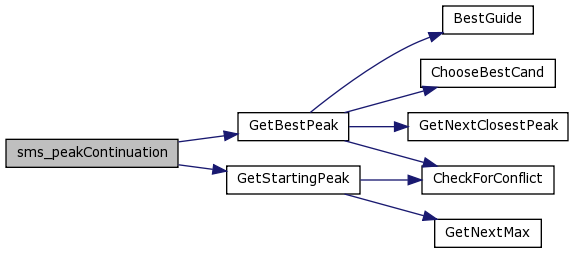
| void sms_PolarToRect | ( | int | sizeSpec, | |
| sfloat * | pReal, | |||
| float * | pMag, | |||
| float * | pPhase | |||
| ) |
Referenced by sms_invSpectrum(), and sms_stochastic().
| sfloat sms_preEmphasis | ( | float | fInput | ) |
References sfloat, and SMS_EMPH_COEF.
Referenced by sms_fillSoundBuffer().
| int sms_prepSinc | ( | int | nTableSize | ) |
prepare the Sinc table
used for the main lobe of a frequency domain BlackmanHarris92 window
| nTableSize | size of table |
References fSincScale, sfloat, Sinc(), SMS_MALLOC, SMS_OK, sms_tab_sinc, and TWO_PI.
Referenced by sms_init().

| int sms_prepSine | ( | int | nTableSize | ) |
prepares the sine table
| nTableSize | size of table |
References fSineIncr, fSineScale, sfloat, SMS_MALLOC, SMS_OK, sms_tab_sine, and TWO_PI.
Referenced by sms_init().
| void sms_RectToPolar | ( | int | sizeSpec, | |
| sfloat * | pReal, | |||
| float * | pMag, | |||
| float * | pPhase | |||
| ) |
| int sms_residual | ( | int | sizeWindow, | |
| sfloat * | pSynthesis, | |||
| float * | pOriginal, | |||
| float * | pResidual, | |||
| float * | pWindow | |||
| ) |
| void sms_scaleDet | ( | sfloat * | pSynthBuffer, | |
| float * | pOriginalBuffer, | |||
| sfloat * | pSinAmp, | |||
| SMS_AnalParams * | pAnalParams, | |||
| int | nTracks | |||
| ) |
| void sms_scaleWindow | ( | int | sizeWindow, | |
| sfloat * | pWindow | |||
| ) |
References sfloat.
Referenced by sms_analyze(), and sms_analyzeFrame().
| void sms_sineSynthFrame | ( | SMS_Data * | pSmsData, | |
| sfloat * | pFBuffer, | |||
| int | sizeBuffer, | |||
| SMS_Data * | pLastFrame, | |||
| int | iSamplingRate | |||
| ) |
generate all the sinusoids for a given frame
| pSmsData | SMS data for current frame | |
| pFBuffer | pointer to output waveform | |
| sizeBuffer | size of the synthesis buffer | |
| pLastFrame | SMS data from last frame | |
| iSamplingRate | sampling rate to synthesize for |
References SMS_Data::nTracks, SMS_Data::pFSinAmp, SMS_Data::pFSinFreq, SMS_Data::pFSinPha, sfloat, SinePhaSynth(), SineSynth(), and TWO_PI.
Referenced by sms_analyze(), and sms_synthesize().

| int sms_sizeNextWindow | ( | int | iCurrentFrame, | |
| SMS_AnalParams * | pAnalParams | |||
| ) |
set window size for next frame
adjusts the next window size to fit the currently detected fundamental frequency, or resets to a default window size if unstable.
| iCurrentFrame | number of current frame | |
| pAnalParams | analysis parameters |
References SMS_AnalFrame::fFundamental, SMS_AnalParams::fSizeWindow, SMS_AnalParams::iDefaultSizeWindow, SMS_AnalParams::iSamplingRate, SMS_AnalParams::ppFrames, sfloat, and SMS_MAX_WINDOW.
Referenced by sms_analyze().
| int sms_spectralApprox | ( | sfloat * | pFSpec1, | |
| int | sizeSpec1, | |||
| int | sizeSpec1Used, | |||
| sfloat * | pFSpec2, | |||
| int | sizeSpec2, | |||
| int | nCoefficients | |||
| ) |
approximate a magnitude spectrum First downsampling using local maxima and then upsampling using linear interpolation. The output spectrum doesn't have to be the same size as the input one.
| pFSpec1 | magnitude spectrum to approximate | |
| sizeSpec1 | size of input spectrum | |
| sizeSpec1Used | size of the spectrum to use | |
| pFSpec2 | output envelope | |
| sizeSpec2 | size of output envelope | |
| nCoefficients | number of coefficients to use in approximation |
References MAX, MIN, sfloat, sms_error(), SMS_MALLOC, and SMS_OK.
Referenced by InterpolateArrays(), sms_hybridize(), sms_stocAnalysis(), sms_stochastic(), and StocSynthApprox().

| void sms_spectralEnvelope | ( | SMS_Data * | pSmsData, | |
| SMS_SEnvParams * | pSpecEnvParams | |||
| ) |
main function for computing spectral envelope from sinusoidal peaks
Magnitudes should already be in linear for this function. If pSmsData->iEnvelope == SMS_ENV_CEP, will return cepstrum coefficeints If pSmsData->iEnvelope == SMS_ENV_FBINS, will return linear magnitude spectrum
| pSmsData | pointer to SMS_Data structure with all the arrays necessary | |
| pSpecEnvParams | pointer to a structure of parameters for spectral enveloping |
References SMS_SEnvParams::fLambda, SMS_SEnvParams::iAnchor, SMS_SEnvParams::iMaxFreq, SMS_SEnvParams::iOrder, SMS_SEnvParams::iType, SMS_SEnvParams::nCoeff, SMS_Data::nEnvCoeff, SMS_Data::nTracks, SMS_Data::pFSinAmp, SMS_Data::pFSinFreq, SMS_Data::pSpecEnv, sfloat, sms_dCepstrum(), sms_dCepstrumEnvelope(), SMS_ENV_FBINS, and sms_error().
Referenced by sms_analyze().
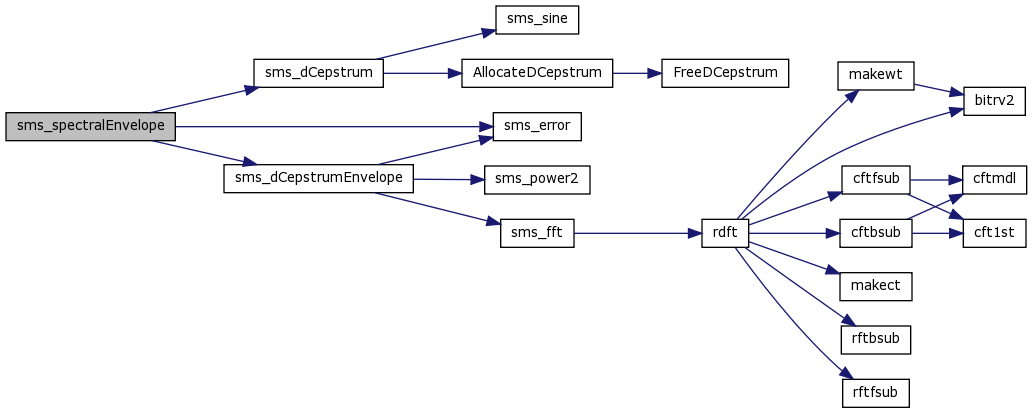
| int sms_spectrum | ( | int | sizeWindow, | |
| sfloat * | pWaveform, | |||
| float * | pWindow, | |||
| int | sizeMag, | |||
| sfloat * | pMag, | |||
| float * | pPhase | |||
| ) |
Referenced by sms_analyze(), and sms_analyzeFrame().
| int sms_spectrumMag | ( | int | sizeWindow, | |
| sfloat * | pWaveform, | |||
| float * | pWindow, | |||
| int | sizeMag, | |||
| sfloat * | pMag | |||
| ) |
Referenced by sms_stocAnalysis().
| void sms_spectrumRMS | ( | int | sizeMag, | |
| sfloat * | pReal, | |||
| float * | pMag | |||
| ) |
| int sms_stocAnalysis | ( | int | sizeWindow, | |
| sfloat * | pResidual, | |||
| float * | pWindow, | |||
| SMS_Data * | pSmsFrame | |||
| ) |
Referenced by sms_analyze().
| void sms_synthesize | ( | SMS_Data * | pSmsData, | |
| sfloat * | pFSynthesis, | |||
| SMS_SynthParams * | pSynthParams | |||
| ) |
synthesizes one frame of SMS data
| pSmsData | input SMS data | |
| pFSynthesis | output sound buffer | |
| pSynthParams | synthesis parameters |
<
References SMS_SynthParams::iDetSynthType, SMS_SynthParams::iSamplingRate, SMS_SynthParams::iStochasticType, SMS_SynthParams::iSynthesisType, SMS_SynthParams::pFDetWindow, SMS_SynthParams::prevFrame, SMS_SynthParams::pSpectra, SMS_SynthParams::pSynthBuff, sfloat, SineSynthIFFT(), SMS_SynthParams::sizeHop, sms_deEmphasis(), SMS_DET_IFFT, sms_deterministic(), sms_ifft(), sms_sineSynthFrame(), SMS_STOC_IFFT, SMS_STYPE_ALL, SMS_STYPE_DET, and StocSynthApprox().
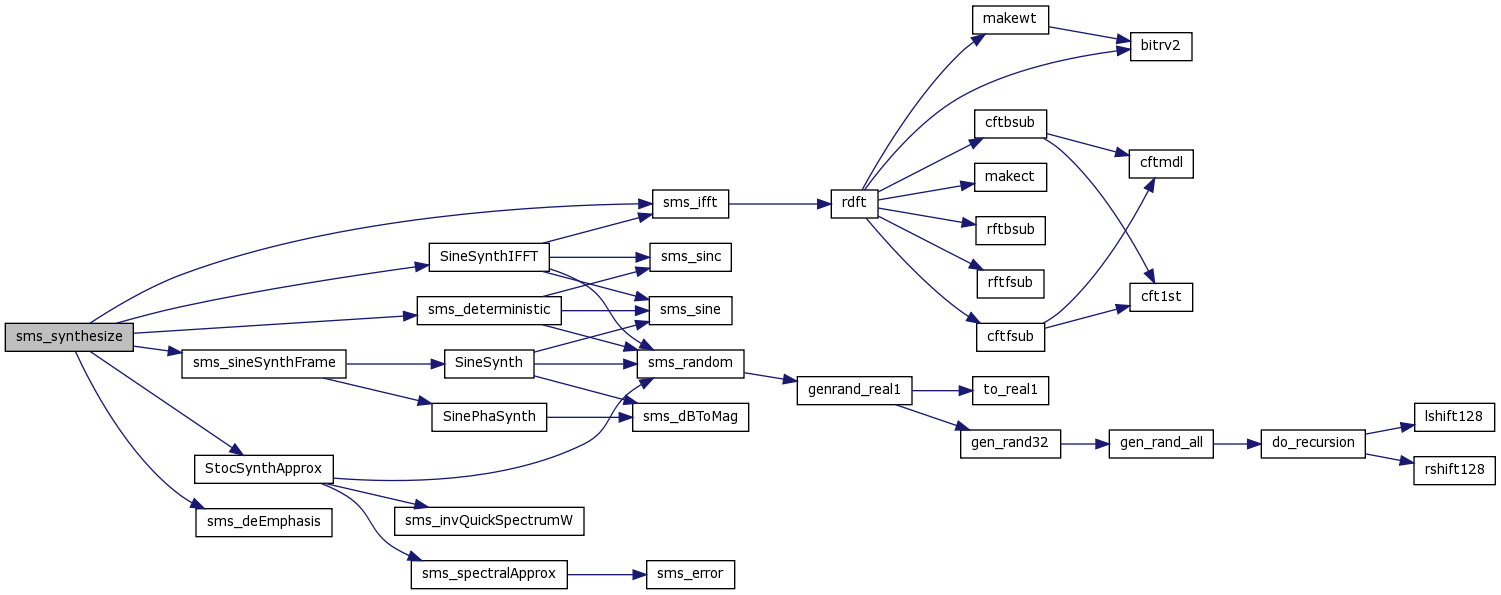
| void sms_windowCentered | ( | int | sizeWindow, | |
| sfloat * | pWaveform, | |||
| float * | pWindow, | |||
| int | sizeFft, | |||
| float * | pFftBuffer | |||
| ) |
Referenced by sms_spectrum().
| void sms_writeDebugData | ( | sfloat * | pBuffer1, | |
| float * | pBuffer2, | |||
| sfloat * | pBuffer3, | |||
| int | sizeBuffer | |||
| ) |
| void sms_writeDebugFile | ( | void | ) |
function to write the residual sound file to disk
writes the "debug.txt" file to disk and closes the file.
References pDebug.
| int sms_writeFile | ( | FILE * | pSmsFile, | |
| SMS_Header * | pSmsHeader | |||
| ) |
rewrite SMS header and close file
| pSmsFile | pointer to SMS file | |
| pSmsHeader | pointer to header for SMS file |
References SMS_Header::iHeadBSize, SMS_Header::nTextCharacters, and sms_error().

| int sms_writeFrame | ( | FILE * | pSmsFile, | |
| SMS_Header * | pSmsHeader, | |||
| SMS_Data * | pSmsFrame | |||
| ) |
write SMS frame
| pSmsFile | pointer to SMS file | |
| pSmsHeader | pointer to SMS header | |
| pSmsFrame | pointer to SMS data frame |
References SMS_Header::iFrameBSize, SMS_Data::pSmsData, and sms_error().

| int sms_writeHeader | ( | char * | pChFileName, | |
| SMS_Header * | pSmsHeader, | |||
| FILE ** | ppSmsFile | |||
| ) |
write SMS header to file
| pChFileName | file name for SMS file | |
| pSmsHeader | header for SMS file | |
| ppSmsFile | (double pointer to) file to be created |
References SMS_Header::iHeadBSize, SMS_Header::iSmsMagic, SMS_Header::nTextCharacters, sms_error(), and SMS_MAGIC.

| void sms_writeResSF | ( | void | ) |
write the residual sound file to disk
References pOutputSNDStream.
| int sms_writeResSound | ( | sfloat * | pBuffer, | |
| int | sizeBuffer | |||
| ) |
function to write to the residual sound file
| pBuffer | data to write to residual file | |
| sizeBuffer | size of data buffer |
References pResidualSNDStream, sfloat, sms_deEmphasis(), SMS_MALLOC, and SMS_OK.

| void sms_writeSF | ( | void | ) |
function to write the output sound file to disk
References pOutputSNDStream.
| void sms_writeSound | ( | sfloat * | pFBuffer, | |
| int | sizeBuffer | |||
| ) |
write to the sound file data
| pFBuffer | data to write to file | |
| sizeBuffer | size of data buffer |
References pOutputSNDStream.
 1.6.1
1.6.1